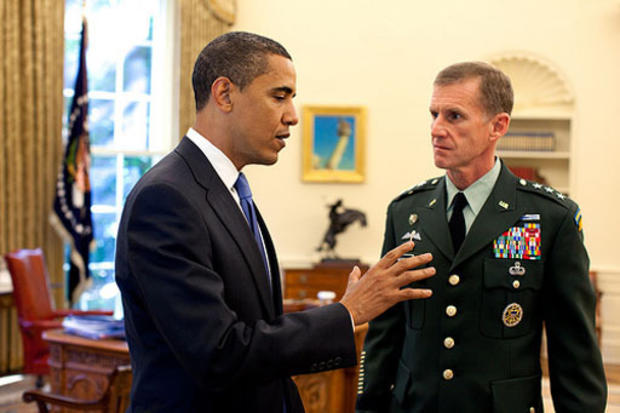Gen. McChrystal: WikiLeaks a Sad Situation
Since being dismissed following a Rolling Stone article for disparaging remarks aimed at civilian national security leadership by him and his aides, Gen. Stanley McChrystal has been pursuing an academic mission.
He is teaching a leadership course at Yale and on Friday discussed the Afghan war and leadership at the Daily Beast's Innovators Summit in New Orleans.
McChrystal spoke just as the substance of 400,000 documents on the Iraq war leaked by WikiLeaks were outlined in the press Friday, citing torture, summary executions and civilian casualties.
"I think it's sad," McChrystal said, responding to a question about WikiLeaks. "The decision to leak classified information is something that is illegal, and individuals are making judgments about threats and information they are not qualified to make. There is a level of responsibility toward our people that needs to be balanced with a right or need to know. It's likely that a leak of that information could cause the death of our own people or some of our allies."
He was asked by interviewer Frances Townsend, a former
assistant to President George W. Bush for homeland security and
counterterrorism, about the impact of media on leadership. The amount of scrutiny and the speed at which information is passed has "changed leadership in ways we don't comprehend yet," McChrystal said. "Information can go will go viral before additional facts are gained and people take a breath."
He added that the media doesn't rise to the level of responsibility it needs to and that people discount certain positions and reporting because they assume it has a certain bias.
He did not comment on the Rolling Stone article that led to his dismissal by President Obama and his retirement from the military.
McChrystal was asked how his military experiences translate to leadership in the private sector.
"Most hardest things are not military," McChrystal said. He described decisions as testing values, judgment and sometimes patience and maturity. "You have to get to the core of a set of beliefs and have the skills to impart them," he said.
He gave an example of leadership in describing a strike against terrorist leader that failed at first, but they were able to convince senior leaders take the "political risk" to give his team another chance at the target. "The ability to go back up in an organization requires you to look internally to determine why you failed," McChrystal said.
McChyrstal was asked to shed some light on the killing in 2006 of Abu Musab al-Zarqawi, a major insurgent leader who was responsible for dozens of bombings and kidnappings in Iraq.
The night after Zarqawi was killed McChyrstal said he gave out one medal, and it was to an intelligence analyst. "The guy never went out on ops, but he pulled the team together. It was a much police-like as military, building an understanding of the man, the leader, and his organization. We attacked the center of organization over and over until we understood the organization...it was not a one day lightening strike....we developed a stronger and stornger understanding until we had a tighter noose."
He attributed some of the success by the U.S. and NATO forces in Afghanistan to "becoming a better team."
"The real innovation is the U.S. government and NATO pulling together, bringing intelligence tighter and tighter....It's not so much technical as cultural," McChrystal said.
He was asked about cuts in defense spending. "If you have to decrease military spending, one thing to protect is the people," McChyrstal said, even at the expense of the amount of hardware and technology. "Talent and effectiveness relies on people....It takes a generation to replace that talent."

